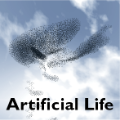Self-organization can be broadly defined as the ability of a system to display ordered spatio-temporal patterns solely as the result of the interactions among the system components. Processes of this kind characterize both living and artificial systems, making self-organization a concept that is at the basis of several disciplines, from physics to biology to engineering. Placed at the frontiers between disciplines, Artificial Life (ALife) has heavily borrowed concepts and tools from the study of self-organization, providing mechanistic interpretations of life-like phenomena as well as useful constructivist approaches to artificial system design. Despite its broad usage within ALife, the concept of self-organization has been often excessively stretched or misinterpreted, calling for a clarification that could help with tracing the borders between what can and cannot be considered self-organization. In this review, we discuss the fundamental aspects of self-organization and list the main usages within three primary ALife domains, namely "soft" (mathematical/computational modeling), "hard" (physical robots), and "wet" (chemical/biological systems) ALife. Finally, we discuss the usefulness of self-organization within ALife studies, point to perspectives for future research, and list open questions.
翻译:自我组织可以被广义地定义为仅仅由于系统各组成部分之间的相互作用而能够显示有秩序的时空形态的系统的能力。这种过程对生活和人工系统都有其特点,使自我组织的概念成为从物理到生物学到工程等几个学科的基础。在学科之间的边界,人工生命(ALife)大量借用了自我组织研究中的概念和工具,对类似生命的现象提供了机械化的诠释,并对人工系统的设计提供了有用的构思性方法。尽管在“生命”中广泛使用,但自我组织的概念往往被过度扩展或误解,要求作出澄清,以帮助追查可以被视为和不能被视为自我组织的事物之间的界限。在本次审查中,我们讨论了自我组织的基本方面,并列出了三个主要的“生命”领域的主要用途,即“软”(数学/民意建模)、“硬性”(物理机器人)和“湿性”(化学/生物系统)ALife。最后,我们讨论了自我组织在“生命”研究、“开放”范围内的自我组织问题和“未来”研究清单中的开放问题。




